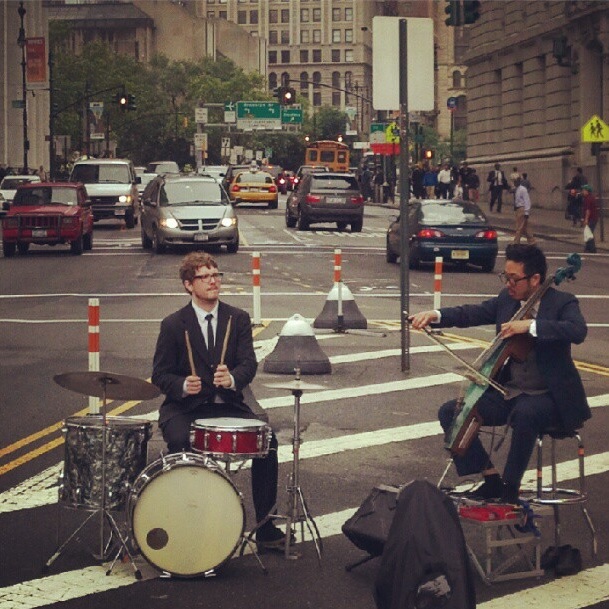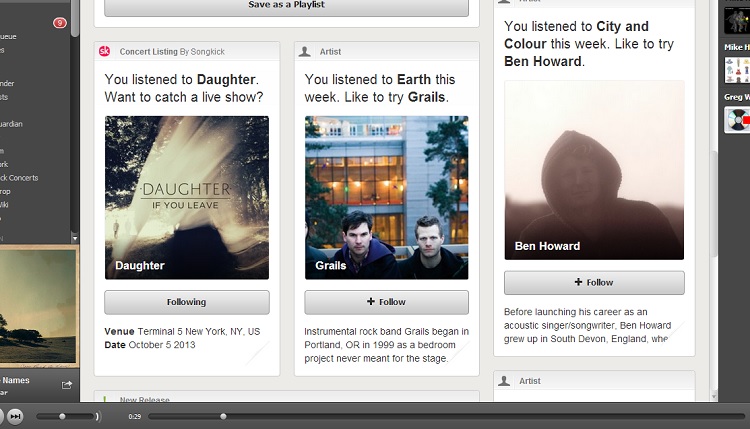
Just as I’m struggling to decide the best way to get the writing rolling again, up pops suggestive streaming app Songza with the required inspiration.
Unusually though, it isn’t the service’s music that’s inspiring this time, but its news: Google is swallowing… sorry, “joining with” Songza.
There goes the (Street View-scoured) neighbourhood.
Sic Transit Songza Mundi
I enjoy Songza.
It’s always been a reliable alternative to the tedious automation of other radio-style streaming services, or the sheer volume of music on Spotify (which is both blessing and curse to the Swedish streaming champ). I like the personal touch, the hand-crafted playlists, and the general feeling that the app’s team have built around their service.
So despite the reassurances that the service will remain in tact, I have my doubts.
Google is operating on a much wider scale in the music industry than the niche that Songza currently occupies. Streaming radio is a viable business, as Pandora has proven, but it’s a field full of competition and limited in its potential as a standalone offering. Songza the independent company can be proud of its 5.5 million monthly active users. Google the international behemoth, meanwhile, would deem that figure a disappointing volume of hourly search queries.
Of course Google has deep pockets and the potential to vastly expand the service. I’m a paid up Google fan boy myself in some ways, with Nexus devices and plenty of business pushed through the Play Store in terms of movie rentals and app purchases, so I don’t decry the general trend for tech companies to improve their entertainment offerings.
What troubles me is their distance from the personal listening exprience, and the pleasant alternative provided by curated platforms like Songza.
Cutthroat Consolidation
The worry for listeners on any independent streaming service must now be that the big sharks are circling in their shallow waters.
It’s not so long ago that Beats swallowed up MOG, only to itself be acquired by Apple for an eye-watering sum last month. After several years of experimentation, the industry is in consolidation mode as the big boys see the potential of Spotify’s model and look to head it off at the pass.
But for the likes of Google, Apple, and Amazon, this is about even more than all music, it’s about offering all content.
These tech giants want to lock consumers into their ecosystem for years to come, most likely via mobile devices. Music is an important factor in attracting consumers to play in their respective sandpits, as are movies and television. The important decision for the wider game that they’re playing is which device you choose to consume this content on, rather than the individual listening or watching choices you make, hence the new Amazon Fire phone.
All this leaves music – and more generally entertainment – as a possible loss leader for Google and its rivals; a piece of a much larger puzzle that needs to be delivered en masse as audiovisual bait for more lucrative transactions in future. Today the new Black Keys album on Amazon Music, but what price a new bog roll subscription for life on Amazon Prime?
 And therein lies the antithesis of what Songza offers music fans, a carefully curated listening experience with a focus on the personal side of songs.
And therein lies the antithesis of what Songza offers music fans, a carefully curated listening experience with a focus on the personal side of songs.
The algorithm-driven approach of Google in itself is cause for concern, but the wider worry must be that the company simply swallows up the Songza experience and bakes it into the more anonymous Google Play ecosystem.
So, Songza Sharky… sink or swim?






